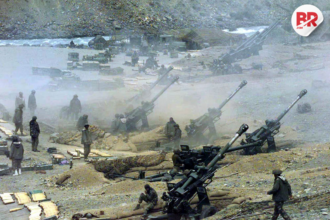
A senior Maoist leader, Pappu Lohara, carrying a bounty of Rs 10 lakh, was killed by security forces in Jharkhand’s Latehar district on Saturday.
This happened just days after the death of the top Maoist leader Nambala Keshav Rao, alias Basavaraju, in Chhattisgarh. The encounter marks another important milestone in the ongoing fight against Maoist insurgency in India.

Pappu Lohara was the leader of the Jharkhand Jan Mukti Parishad, a splinter Maoist group operating in the region.
Along with him, his aide Prabhat Ganjhu, who had a bounty of Rs 5 lakh, was also killed. Another member of their group was injured and arrested during the encounter, and security forces recovered an INSAS rifle from him.
This recent encounter came just three days after Basavaraju, the former head of the Central Military Commission and General Secretary of the Maoists, was killed.
Basavaraju was one of the highest-ranking leaders in the Maoist hierarchy, carrying a massive bounty of Rs 1.5 crore. He was wanted by the National Investigation Agency (NIA) and police forces across Telangana and Andhra Pradesh.
Also Read Who Was Basava Raju? Top Naxal Commander Killed in Chhattisgarh
Union Home Minister Amit Shah called these encounters a “landmark achievement in the battle to eliminate Naxalism.” He highlighted that it is the first time in three decades that a Maoist General Secretary has been neutralized by Indian forces.
Since the completion of “Operation Black Forest,” a special anti-Maoist operation, 54 Maoists have been arrested, and 84 have surrendered across Chhattisgarh, Telangana, and Maharashtra.
Mr. Shah also reaffirmed the government’s commitment to end Naxalism by March 31, 2026. This strong political will, combined with the bravery of security personnel on the ground, signals that the tide may be turning in India’s long fight against Maoist insurgents.
For many living in affected areas, these wins bring hope. It means less fear and more opportunity for development projects to take root. After all, a stable Jharkhand and Chhattisgarh mean better roads, schools, and jobs for ordinary people.
To understand more about the history and impact of Maoist insurgency, you can visit this detailed report by the Institute for Conflict Management. Meanwhile, for more updates on security operations, see our latest articles on Naxalism in India.
In short, killing Pappu Lohara is a sharp jab to Maoist networks in Jharkhand. It shows the Indian government’s resolve and sends a clear message: Naxalism will not find a safe haven here anymore.
Also Read 3 Maoists Killed in Chhattisgarh’s Bijapur in First Encounter After Ceasefire Request












